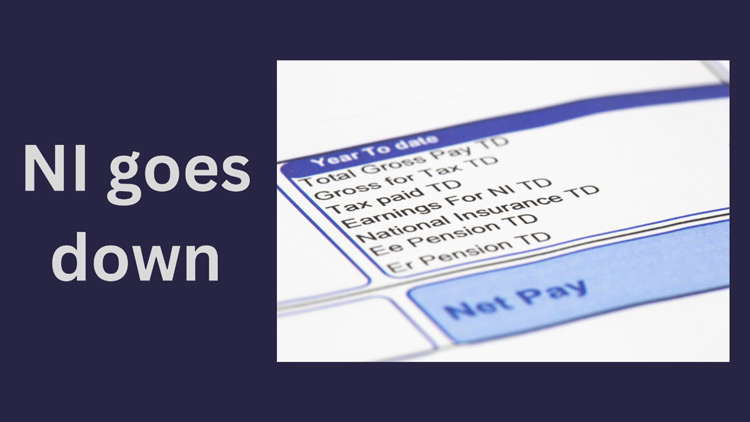National Insurance goes down

The Autumn statement had a lot of fluff and didn't please everyone (does it ever), but one positive for business people is the reduction in National Insurance deductions.
In simple terms:
For employees, Class 1 NI PAYE deductions have gone down from 12% to 10%. And the bonus is that, instead of this coming into effect on 6th April 2024, it will actually start on 6th January.
Most professional accounting software will be automatically updated, so payroll departments or providers won't need to do any manual changes. However, it's best to double-check that your system has updated.
For the self-employed, Class 4 NI will reduce from 9% to 8%, but unlike Class 1, this won't take effect until 6th April 2024.
In addition, Class 2 NI contributions payable by self-employed people who have profits exceeding £6725, but less than the £12,570 threshold will be abolished as of 6th April 2024. Currently there is a flat rate annual payment of £163.80.
There is one issue that is still to be resolved, and that is how the abolishment of Class 2 NI contributions will impact on pensions contributions. We're looking into this and will be clarifying this situation as soon as information becomes available.
High earners tax returns
Another announcement in the Autumn Statement was that people who earn a salary above £150K per annum as an employee and pay PAYE no longer need to file a personal tax return.
On one hand that sounds like it's a benefit. However, most people who earn at that level usually have other income from investments or property rental. A self-assessment tax return still needs to be filed if you have any other income, so, unless you're stacking the money up in a bank account (which is not the best thing to do with your money) or spending it all on fast cars and fine dining, you'll probably need to file a tax return in any case.
So, it's a strategy that appears to give on one level, but, in reality, will make very little difference to most high earners.